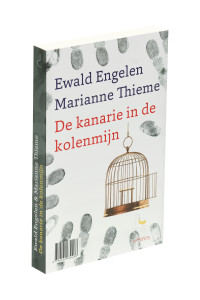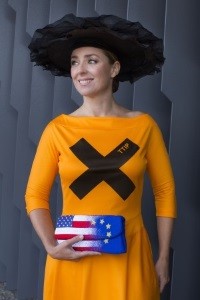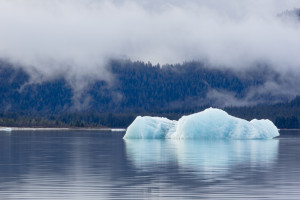Worldlog 18 de abril de 2016
No domingo dia 10 de abril tivemos o 22º congresso de nosso partido. Mais de 400 membros estiveram presentes nesse dia inspirador. Em cada congresso eu acho de novo especial que pessoas com fundamentos muito diversos compartilham os ideais de nosso partido. Além dos assuntos usuais como o Relatório Anual e as Demonstrações Financeiras houve uma palestra do professor universitário em geografia financeira Ewald Engelen sobre o seu ponto de vista concernente a crise bancária. Ele comparou o sistema financeiro completamente podre com a maneira pela qual o fornecimento de alimentos é organizado com todos os inerentes escândalos alimentares como a fraude com carne de cavalos. Ele também contou como ele se transformou de inveterado comedor de carne para vegetariano. Junto com Ewald eu escrevi o novo livro “De Kanarie in de Kolenmijn” (O Canário na Mina de Carvão).

No Canário na Mina de Carvão as nossas opiniões a respeito da economia e da ecologia se reúnem. O livro vai surgir na Holanda esta semana. Especialmente para interessados internacionais será publicada uma versão em inglês em formato digital (ebook). Esperamos que isto aconteça no início de maio e portanto lhes porei ao corrente!
Nos meus Worldlogs anteriores eu contei sobre o plebiscito efectuado na Holanda no dia 6 de abril onde os holandeses puderam votar a favor ou contra o tratado de livre comércio entre a UE e a Ucrânia. Junto com meu partido eu fiz dura campanha contra o tratado e por isso fiquei feliz que a maioria das pessoas também votaram contra. Eu acho que o nosso governo, que é a favor, certamente não pode ignorar que o plebiscito resultou em contra. Na semana passada houve um debate na Câmara Baixa onde eu novamente indiquei que um não do povo holandês literalmente também deve significar um não e que portanto o tratado não pode ser ratificado.
Anteriormente eu também já insisti junto ao nosso governo para organizar um plebiscito sobre TTIP. Naquela ocasião meu pedido foi rejeitado. O resultado do plebiscito sobre o tratado de livre comércio com a Ucrânia demonstra que a maioria dos eleitores olha criticamente para tratados de livre comércio. Por isso mesmo eu apresentei de novo uma moção para um plebiscito sobre a conveniência de TTIP. Na semana de 25 de abril haverá uma votação sobre isto.

‘Qual é a utilidade de dinheiro quando a camada de gelo derrete?‘ Este foi o título de minha contribuição ao debate sobre a Região Árctica na semana passada. Nós queremos que o governo se esforce ao máximo pela protecção do Polo Norte. O governo se esforça pela melhor protecção possível do Polo Sul, mas no caso do Polo Norte parece que o governo deixa prevalecer o ganho económico sobre a vulnerável natureza e meio-ambiente.
Pois apesar da Câmara ter aceito uma moção minha em 2014 para salvaguardar a Região Árctica da extracção de petróleo e de gás, o governo parece focalizar no desenvolvimento de possibilidades económicas na região do Polo Norte. O governo quer até mesmo defender activamente os interesses de empresas holandesas que podem ganhar dinheiro com a sondagem de petróleo e de gás agora que o Polo Norte está se aquecendo.

O governo quer proteger tudo aquilo que é belo, virgem e valioso, excepto quando há dinheiro no solo. O governo deve pôr sua prioridade no resguardo da Região Árctica e do planeta inteiro de mais aquecimento e poluição. Não existe nenhum outro interesse que possa pesar mais.
Isso foi tudo por agora, até a próxima!
Com sinceridade,
Marianne
On Sunday the 10th of April, we celebrated our Party´s already 22th congress. More than 400 members were present on this inspiring day. Every congress it is remarkable to see people of so many different backgrounds sharing our party’s ideals. In addition to the customary items such as an annual report and annual financial accounts, Professor of Financial Geography Ewald Engelen gave a guest lecture on his views of the banking crisis. He compared the thoroughly rotten financial system to the way our food supply, with its many food scandals including the horse meat fraud, is organised. He also talked about how he had shifted from being a confirmed meat-eater to being a vegetarian. Together, Ewald and I have written our new book De Kanarie in de Kolenmijn (The Canary in the Coal-mine).

In De Kanarie in de Kolenmijn, our visions on economics and ecology meet. As of this week, our book will be sold in the Netherlands. An English version in the form of an e-book will also be published specially for our international readers. This e-book is expected to come out in the beginning of May, so I will keep you informed!
In my last Worldlogs, I have written about the referendum that was held in the Netherlands on 6 April. With this referendum, the Dutch people were able to indicate whether they were in favour of or against the trade agreement between the EU and Ukraine. Together with our party members, I have campaigned strongly against this agreement and I am therefore glad that a majority of the Dutch citizens has also voted against. I think that our government, which is in favour of the treaty, may definitely not ignore the result of this vote. Last week, during a debate in the Lower House, I have indicated once again that a no vote by the Dutch people should literally mean no, and the treaty should therefore not be ratified.
Earlier I have urged our government to hold a referendum on TTIP, but my request was denied. The result of the referendum on the EU/Ukraine treaty shows us that a majority of our voters are critical of free trade agreements. That is why I have once again tabled a motion for a referendum on the desirability of TTIP. It will be put to the vote during the week of 25 April.

“What good will money do you when the icecaps are melting?” That was the title of my contribution to the debate on the Arctic Region last week. We want to see the government fully commit itself to the protection of the North Pole. The Dutch government is fighting for optimum protection of the South Pole, but when it comes to the North Pole, economic gain seems to be put above the fragile wildlife and environment.
After all, despite the fact that the Lower House carried my motion of 2014 on safeguarding the Arctic Region against oil and gas extraction, the government still seems to be focusing on developing economic opportunities in the Arctic. The government is even planning on taking an active role in looking after the interests of Dutch companies that will make money from oil and gas drilling, which has now become possible due to the warming of the North Pole.

The government is willing to protect all that is beautiful, unspoiled and meaningful, expect when there is money in the ground. The government should make the protection of the Arctic Region and the entire planet against further warming and pollution its priority. No other interest can be of more importance.
That’s it for now, until next week!
Kind regards,
Marianne